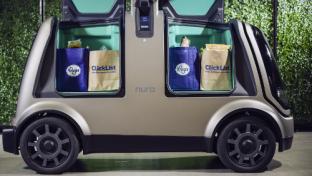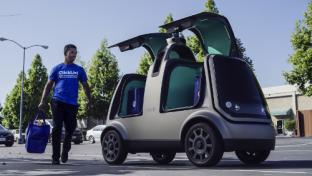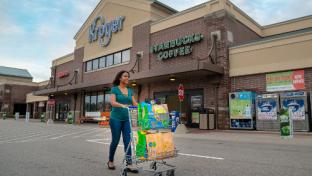Kroger Officially Launches Autonomous Delivery, Adds New Car Model to Fleet
The Kroger Co. has officially launched its grocery delivery via unmanned vehicles to the general public in its initial target market, but has added a new model to the fleet of cars.
Partnering with Nuro, the Mountain View, Calif.-based developer of the world’s first fully unmanned road vehicle, Kroger made the formal debut in Scottsdale, Ariz., but has expanded it to include Nuro's R1 custom unmanned vehicle, which travels public roads and carries no drivers or passengers – just the goods being delivered. Joining the Prius fleet involved in the pilot, the R1 has been in development since 2016.
Delivery will be available seven days a week from a Fry's Food Stores location in Scottsdale. Same- and next-day deliveries can be scheduled at frysfood.com or via the grocer's mobile app, all for a $5.95 flat fee with no minimum required.
"Kroger customers are looking for new, convenient ways to feed their families and purchase the products they need quickly through services like pickup and delivery," said Yael Cosset, Kroger's chief digital officer. "Our autonomous delivery pilot with Nuro over the past few months continues to prove the benefit of the flexible and reliable technology. Through this exciting and innovative partnership, we are delivering a great customer experience and advancing Kroger's commitment to redefine the grocery experience by creating an ecosystem that offers our customers anything, anytime, and anywhere."
Kroger announced the new grocery technology in June, revealing its plan two months later to pilot the grocery technology in Scottsdale, Ariz., starting in the fall.
By using autonomous vehicles for grocery delivery, Kroger can dramatically reduce last-mile costs, Ken Fenyo, head of consumer markets at McKinsey Fast Growth, and previous VP of loyalty at Kroger, told Progressive Grocer in June. According to McKinsey research, a 40 percent saving in delivery costs would translate into a 15- to 20-percentage-point increase in profit margin or a 15 to 20 percent cut in prices.
"This is a substantial opportunity in an industry with margins ranging between 2 percent and 5 percent," Fenyo said. "Most likely, retailers will need to adopt a range of last mile delivery options depending on location, demographics, competition, and other factors including autonomous vehicles, drones, on-demand services, click and collect, and even dedicated trucks."
In other Kroger technology news today, the grocery giant announced the divestiture of its digital coupon and rebate publishing unit to Inmar, a technology and data analytics firm based in Winston Salem, N.C. Through the deal, You Technology will become a part of Inmar, and Kroger will hold a long-term services agreement for continued delivery of digital offer management services from the firm.
The Kroger Co. operates a seamless digital shopping experience and 2,800 retail food stores under a variety of banner names nationwide. The Cincinnati-based company is No. 2 on Progressive Grocer's 2018 Super 50 list of the top grocers in the United States. It also is Progressive Grocer's 2018 Retailer of the Year.






